June 24, 2022
Make Music Day – thank you!

Congratulations to all who took part in Tuesday's Make Music Day!
More than 3,000 music-making events took place in the U.S. on June 21, along with performances by thousands more musicians in 120 countries around the world who celebrated the day.
- Check out 134 press clips about Make Music Day 2022, from media outlets in 60 U.S. cities, to learn about events you may have missed!
- Congratulations to the winner of this year's Young Composers Contest, Matthias Bergmann of Austria! A recording of his piece has been recorded by The Swingles and posted on our site.
- Great videos are coming in from #MySongIsYourSong partners, with a few dozen already posted here.
- And the Global Live Stream is available for replay, with performances from Australia, Germany, UK, India, the US, and more!

June 20, 2022
Street Studios Return!
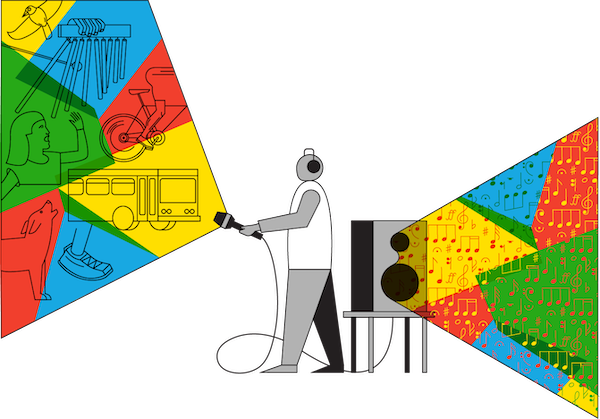
After a two-year pause during the pandemic, Street Studio Cities returns to the streets tomorrow for Make Music Day!
Street Studio Cities, organized with Found Sound Nation and HARMAN, bring music producers onto the streets on June 21, setting up mobile recording studios on sidewalks, plazas, and parks. In one afternoon, producers invite passersby from the community to join in a completely improvised music creation session. At the end of the day, each producer mixes down one track, using only the material recorded on-site, to share the sounds of their city with the world.
This year's producers – including Trayer Tryon (from Hundred Waters), Jeremy Thal (Neutral Milk Hotel), and Nandi Rose (Half Waif) – will be stationed in 11 cities in 5 countries, ready to record and make street life more musical.

June 20, 2022
Partner of the Week: Harman
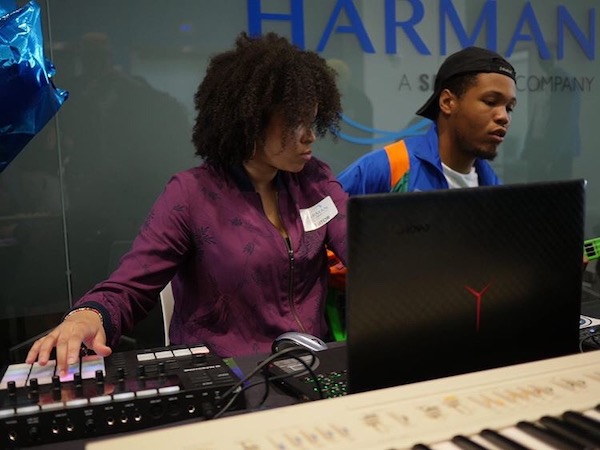
Harman has been a crucial supporter of Make Music Day for the last seven years, part of their unwavering commitment to music and music education.
Not only do they sponsor the international Street Studio Cities, but Harman employees get into Make Music Day on a very personal level. From Detroit to Poland, employees on June 21 will perform in musical talent shows, learn new instruments, and play music with each other, all over the world.
Thank you Harman for your global leadership!

June 20, 2022
Make Music Country of the Week: Nigeria
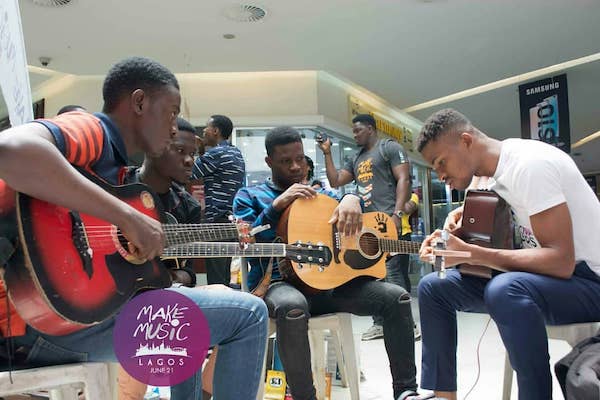 Since 2016, Make Music Lagos has brought hundreds of outstanding participatory events – and superstars like King Sunny Adé – to public spaces in the city each June 21.
Since 2016, Make Music Lagos has brought hundreds of outstanding participatory events – and superstars like King Sunny Adé – to public spaces in the city each June 21.
Now the organizers are going even bigger, expanding their event into a nationwide Make Music Nigeria, with events in Lagos, Abuja, Akwa Ibom, Ibadan, and beyond! And over 160 Nigeria songwriters are participating in #MySongIsYourSong from all over the country.
Learn more on their website!

June 17, 2022
The Jazz Foundation: Providing a Safety Net for Jazz and Blues Musicians
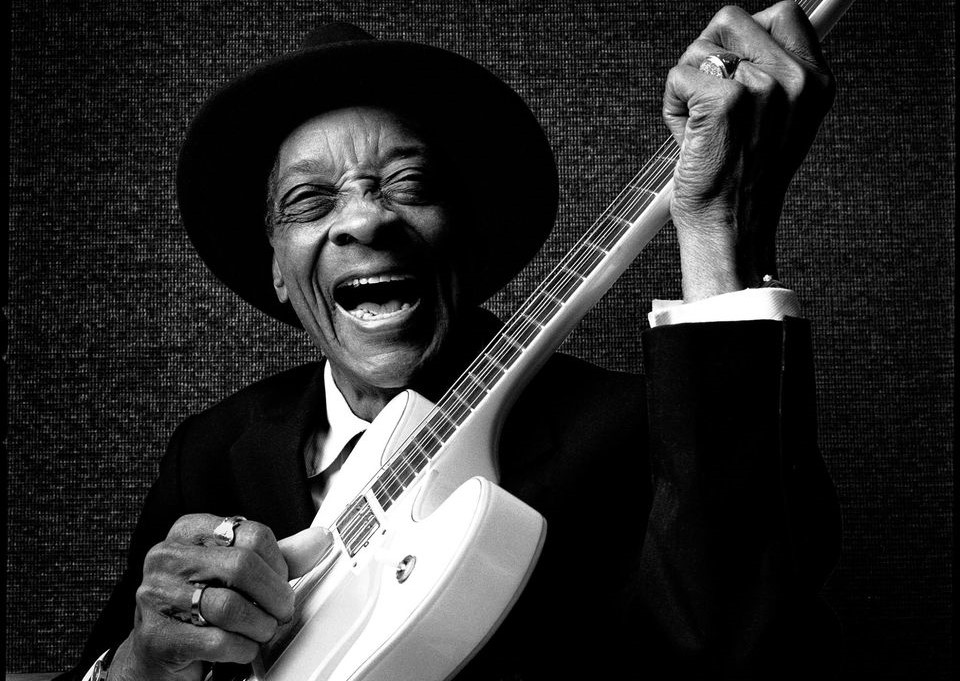
Interview with Will Glass, Program Director of the Jazz Foundation, conducted by the Make Music Alliance in May 2022
How did the Jazz Foundation get started?
It was founded in New York in 1989 by a small group of musicians and musician advocates, including Dr. Billy Taylor, Phoebe Jacobs, Ann Ruckert, Cy Blank, and Herb Storfer. It was founded because these people saw a gap in support for lifelong musicians, particularly in jazz, and it was founded as a safety net for these artists.
What work did the foundation do to begin with?
The first ten years or so were small; it was largely a gentleman in his apartment with a checkbook, giving out grants for the Jazz Musicians Emergency Fund, which was the primary program of the Jazz Foundation in the beginning. Around the year 2000, Wendy Oxenhorn came on as Executive Director and fundraising really stepped up with our annual “Great Night In Harlem” gala at the Apollo Theater, and a lot of people know us through that event, because that’s been 20 years of A-list performers at the Apollo. Our relief efforts also stepped up out of necessity, particularly after Hurricane Katrina, when we helped over a thousand musicians who had lost their homes through a period of great difficulty.
I see that you create work opportunities for musicians; when did that begin?
In the aftermath of Katrina is also when our role stepped up as a provider of work opportunities. Our Jazz in the Schools has started a little before that, but when Katrina happened and there were no gigs anywhere in New Orleans we were able to use Jazz in the schools, and also concerts in nursing homes and community centers as a way for musicians to have places to play, and we would pay them. To this day we have around a dozen bands in New Orleans who play every month, and we have a co-worker who lives down there. I administer around a dozen bands in New York, and there are some other bands in other states like Wisconsin, Michigan, Illinois, Kansas, California, who perform for us regularly, largely in schools and nursing home. One of our crucial early allies for our “gig fund” was the Make Music Alliance. We had some money to try to create some work, and through the Make Music Alliance we were able to connect with local venues, connect with musicians we know, and do several concerts around the country all at once. Make Music was a critical partner that helped us realize this vision of setting up bands in public spaces and letting them play.
Now that live performances are returning, what are you working on for the immediate future?
I think for the performance programs this summer is proving that our outdoor programming is going to remain robust, that the demand for live music is huge, and the benefit and the joy and the healing that comes with hearing live music is more in demand than ever before. Our outdoor programming of the kind we started with Make Music is going to continue to grow, we will continue to work with our partners, and then I hope that we will be getting back to our indoor programming, particularly in schools and nursing homes, because those are populations that we love to reach and that have always loved having our bands visit, and hoping that it’s safe enough in September so we can get back to that and expand that as well. But, as everyone knows, things are still a little bit uncertain, so one day at a time, I guess!
Do you think live music is appreciated more after the past two years?
Absolutely; I think more people might recognize the difference in the physical sensation of feeling the vibration in the air of music, of being there when it is live, as opposed to experiencing it virtually or even through recordings. After two years of being inside, you really feel the difference when you hear those instruments in person, and hopefully it will encourage people to get back out there. Some of our staff was in New Orleans last week for the Jazz and Heritage Festival, and the joy was palpable, and that was a good sign of live music really coming back strong.

June 17, 2022
MTNA: Helping to Raise the Level of Music Teaching Nationwide

Interview with Dr Gary L. Ingle, Executive Director and CEO of Music Teachers National Association, conducted by the Make Music Alliance in May 2022
How did the organization start?
The MTNA was started in 1876; there was a group of very important music teachers, one of whom was Theodore Presser, who later started the publishing company, and the started with about 60 teachers from around the country and established this organization.
What was the impetus for founding the MTNA?
There was great concern across the country about the quality of music teaching; there were a lot of individuals who were teaching music who had very little training, very little skills, but it was one of those things that anyone could do if they play the piano or feel like they could sing, they could give lessons. So, there developed this strong sense that the music teaching profession needed to increase its professionalism and the quality of the teaching, so they organize MTNA and started annual conferences in order for the leaders in music teaching to come together and exchange ideas. About ten years after it was formed, the decision was made to establish the American Conservatory of Music, which was our first certification program. As more and more teachers joined, groups of teachers started their own organizations for specific instruments, for example the American String Teachers Association came from MTNA, as did NAFME itself
Can you tell me about your certification?
The MTNA certification program has gone through many different versions over these hundred and thirty some years, and at times there have been emphases within the individual state associations to create their own state certification program. Most if not all of the states have moved away from individual state certification, to everyone getting their national certification; with the mobility of people nowadays, moving from place to place, it makes even more sense to be nationally certified, rather than state to state. The certification program is to designed provide an opportunity for a candidate to demonstrate to an outside group of specialist evaluators that they have the knowledge and the ability to teach their instrument in a professional, competent manner. Each candidate for certification is required to do a variety of projects which are evaluated by the certification commissioners, to determine if they possess the minimum qualifications to be a good music teacher. Those projects will cover things like developing a philosophy of music, demonstrating knowledge of musical analysis in a way that makes it easily understandable to students, demonstrating knowledge of child development and learning. Also, because private teachers are individual businesses, there is a requirement for each candidate to demonstrate a basic knowledge of business aspects of teaching, such as budgeting, studio policies, marketing, website, use of virtual applications within the profession.
We would like to see that the quality of music education in the private setting is the best it can be. We want customers to be secure in the knowledge that if they hire an MTNA certified teacher for their child, they will receive a high level of competency and professionalism. It gives the teacher some prestige and a marketing advantage over uncertified teachers.

June 17, 2022
Levitt Foundation: Strengthening the Social Fabric of America Through Music
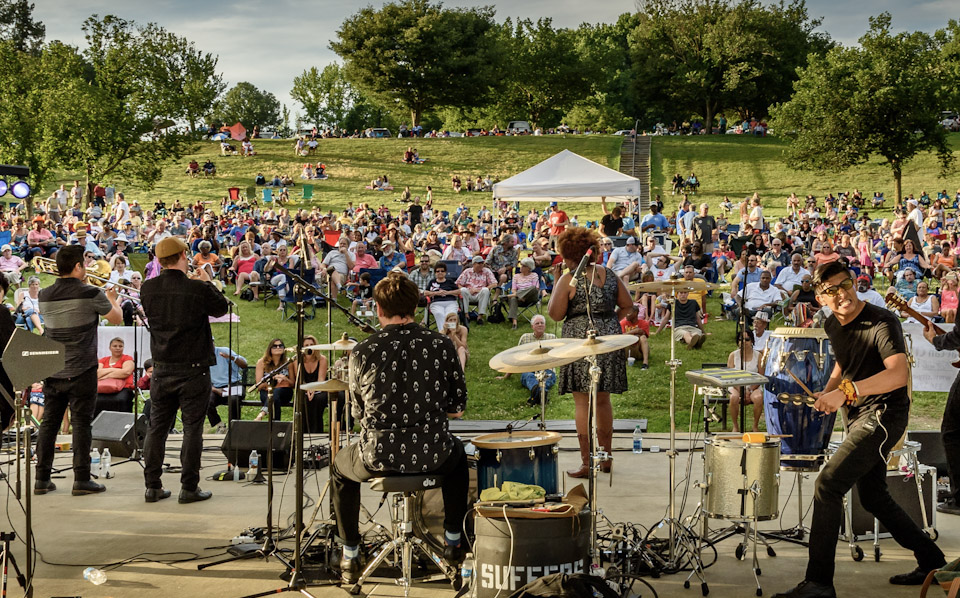
When was Levitt founded, and what was the catalyst for this?
The Levitt Foundation was founded in 1966 by Mortimer Levitt—his was a rags to riches American story. Mortimer was the son of immigrants who made his fortune in custom-made men’s clothing with his company, The Custom Shop. Mortimer was an outspoken advocate for the arts and together with his wife, Mimi, a dedicated philanthropist. The Levitt family was the primary benefactor of the original Levitt Pavilion in Westport, Conn., which opened in 1974 and transformed the town dump into a community gathering space for free outdoor concerts.
Over two decades later, in 1999, the continuing success of the Levitt Pavilion in Westport inspired Mortimer to lay the groundwork for a national network of Levitt venues so communities across the country could come together through the shared experience of free music under the stars. When Mortimer was 90, he sold his company (which by then included 70 Custom Shop retail branches nationwide) and transferred the proceeds to the Levitt Foundation. Carrying memories of his impoverished childhood, when he was unable to experience concerts due to the price of admission, Mortimer was passionately committed that performances at Levitt venues would be presented at no charge. He soon passed on the reigns of the Foundation to his daughter, Liz Levitt Hirsch, to oversee its venture philanthropy program. Over the past two decades, the Levitt Foundation has awarded more than $20 million in grants to local nonprofits, bringing thousands of free outdoor concerts to millions of people across the country.
What is your primary mission?
The Levitt Foundation exists to strengthen the social fabric of America. We partner with communities to activate underused outdoor spaces, creating welcoming and inclusive destinations where the power of free, live music brings people together and invigorates community life.
What was your first venue?
The first Levitt Pavilion opened in Westport, Connecticut, in 1974. In the early 1970s, Mortimer and his wife, Mimi, were approached to support a community-led project in Westport, Connecticut, where they were summer residents, to transform the town dump into an outdoor performance venue. They ultimately became the campaign’s largest private contributors, prompting the town to name its new pavilion after them and which became the first Levitt Pavilion.
How do the results of the research that you fund inform how you work?
The Levitt Foundation is committed to research and ongoing self-reflection, as well as contributing to the overall field of creative placemaking to create more joyous and equitable public spaces. Over the years, we have commissioned third-party, multi-year research to evaluate the social impact of Levitt programs across the country. The findings from this research have impacted our philanthropic practices, programs, and processes in myriad ways. As an example, our 2021 whitepaper, Listening to the Music of Community Change: Findings from a Pre/Post Research Study at Levitt Pavilion Denver, explored strategies to engage local communities in placemaking work that authentically reflect a neighborhood’s character, history and aspirations, while inspiring community attachment and fostering a sense of belonging over time.
The past two years of the pandemic have caused everyone to adjust course; what are some ways that Levitt has adapted to meet the needs of a changed world?
Early on in the pandemic, the Levitt Foundation confirmed our commitment to our nonprofit partners and grantees, pledging our support regardless of how, or whether, they were able to continue their programming. While our funding practice is rooted in being a supportive partner, throughout the past two years we’ve taken a deeper dive with our grantees and partners and discovered additional ways to provide support and resources, as well as opportunities for collaboration. For example, we began hosting regular virtual town halls with our grantees and partners, and we also launched a special Bridge grant to support their broader community-building efforts during this time. We identified and shared resources on presenting virtual concerts and programming and produced a nationwide virtual music series with our AMP grantees.
The Levitt Foundation has always been committed to equity, diversity and inclusion, and the racial reckoning spurred by the killing of George Floyd in 2020 inspired the Foundation to go further, to become more expansive in our support and commitment to investing in BIPOC organizations and those serving historically marginalized and underrepresented communities through grants and special initiatives that reflect our mission to build community through music.
For example, in 2022 the Levitt Foundation is a sponsor and community partner of the Unityfest Juneteenth Celebration in New York, celebrating the vibrancy and significant contributions of Black artists and culture into American society. We’re also supporting the free portion of the Celebrate AMERI’KANA Festival, taking place this September in Kansas City, which will explore American music’s past and present by focusing on deeply-rooted BIPOC influences.
As an organization, we continue to examine our internal practices, funding strategies and program criteria to ensure equity, diversity and inclusion is at the center of all that we do.
What are your goals in the future?
The Levitt Foundation believes access to the arts and open green spaces are fundamental human rights, and we will continue to invest in communities across the country, large and small, to bring people together of all ages and backgrounds through the power of free, live music. We will continue to fund projects that are catalytic, dynamic, and that center joy, inclusivity, and connection as a reflection of our core values. In addition to supporting free outdoor music series, we are exploring additional ways to support building community through music—including music, arts and culture ecosystems, creative placemaking field building, research of arts investments impact in the public realm, and other initiatives at the intersection of music and public space.

June 17, 2022
Percussive Arts Society: Supporting Drummers and Percussionists Across the Globe

Interview with Joshua Simonds, Executive Director of the Percussive Arts Society, conducted by the Make Music Alliance in May 2022
When was the Percussive Arts Society formed?
The organization just celebrated our 60th anniversary last year. It was founded by 14 people who met at a Midwest clinic and they said we need a society for us, for drummers and percussionists. It started out of the orchestral and academic world, and in 60 years it has grown to include all drummers and percussionists regardless of style or genre. It really is a special place; drummers and percussionists have this bond, there is something that draws us together and PAS is that family network for this community.
What is your mission?
Our primary mission is to support drummers and percussionists across the globe in every area of music, through education, research and performance. We embrace everybody, and we feel that drums and percussion is one of the most accessible instruments in the world, if not the most accessible instrument.
I started at PAS in 2016, and I follow a long line of leaders; many of those people that you see in our Hall of Fame were at one point past presidents or had other responsibilities, it wasn’t an organization that had a staff; for many years it was volunteer run, but now we are probably the largest music organization around, in terms of an individual instrument. As executive director I oversee all of our programs and our staff of ten. We operate a museum in Indianapolis which is one of our major programs, and we have PASIC, our annual conference, which has happened every year since 1976.
Can you tell me a little about your museum?
Rhythm Discovery Center is the name of our museum, it was started in around 2009 when the PAS moved from Oklahoma where we were headquartered to Indianapolis.The City of Indianapolis and Visit Indy, one of our partners, helped relocate us and said hey, you have this amazing organization and conference, but you also have this world class collection, why don’t we build it out, so with their help we founded the Rhythm Discovery Center. It’s an interactive museum; when you go through it you have an opportunity to really learn about many instruments. We have a whole area called “Wood, Metal and Skin”, the three main ways drums and percussion are put together, we have an entire exhibit of drum sets, historic through modern day, and many opportunities for people to play drums. Wherever there is an opportunity for people to play an instrument, we also provide information for them to learn about it so it’s a nice balance between having fun and playing, and learning about what you are playing and seeing historical and one of a kind instruments as well. We have “Groove Space” which is this whole wall of about a hundred different types of percussion, where visitors can try out all different kinds of drums and percussion instruments. We have such great sponsors and supporters, the percussion industry is very kind to us and makes sure that we have instruments available that people can come in and play; it’s a great collaboration between lots of people.
That sounds super fun!
It is super fun, and it is important to note that it is not a children’s museum. Of course kids love it, but we actively try to do programs for adults because we know that adults come in and want to play, but you’re not going to take a stick away from a kid, so we tailor events for all ages.
We have quite a few one of a kind instruments, we are a place that people donate their instruments to because they want to see them preserved forever. We are able to showcase items in the Rhythm Discovery Center, but also we can preserve them in our collection, and have them available for research. We have a team of people who are specialized in our collection and it’s really exciting. Some of our collection is available for viewing online, and it is available to anyone who wants to explore it.

June 16, 2022
Mass Appeals Nationwide
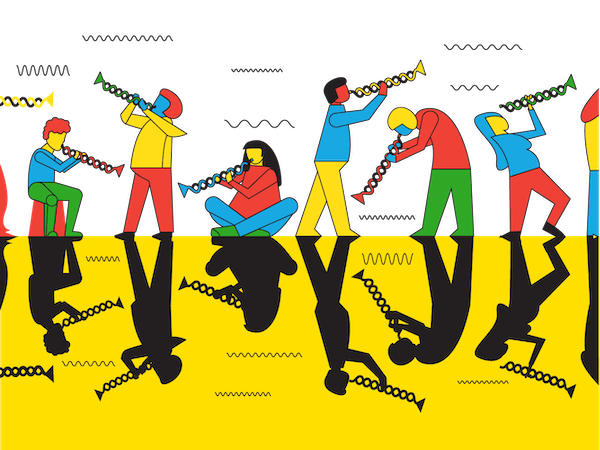
Did June sneak up on you, and you're still not sure of your Make Music Day plans?
Not to worry – in 66 cities around the country, Mass Appeal events are taking place on June 21. Not quite music lessons, not quite jam sessions, Mass Appeals are a special kind of musical happening of their own. And anyone can take part – in many cases, you don’t even need to bring an instrument!
Just show up to one of these 129 Mass Appeals to get a free Hohner harmonica and join a harmonica band, pick up a pair of Promark drumsticks and start bucket drumming, use RBI percussion instruments at a drum circle, or strum along on the ukulele. It couldn't be simpler!
Or venture further off the beaten path, and join one of the 26 Flowerpot Music events (with free mallets from Vic Firth), 13 interactive Makey Makey events, 28 Jumbie Jam events for steelpans, or 8 Sousapaloozas (with free reeds for sax and clarinet players from D'Addario).
Happy Make Music Day!

June 16, 2022
Partner of the Week: Alfred Music

Speaking of Mass Appeals, this week we give special thanks to Alfred Music, a longstanding Make Music Day partner celebrating its 100th year in business.
Alfred is providing free copies of the book “It’s Ukulele Time” at dozens of Mass Appeal Ukulele events, giving everyone an excellent introduction to the instrument, and a set of classic songs to play together.
Check out the 27 Alfred ukulele events here!




